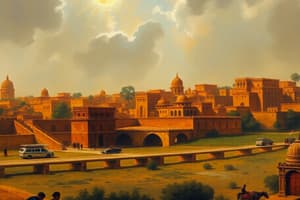Podcast
Questions and Answers
When did the first civilizations emerge?
When did the first civilizations emerge?
- Around 1000 BCE
- Around 5000 BCE (correct)
- Around 1500 CE
- Around 2000 CE
Which river was Mesopotamian civilization primarily built along?
Which river was Mesopotamian civilization primarily built along?
- Tigris River (correct)
- Yangtze River
- Nile River
- Ganges River
What marked the beginning of Egyptian civilization?
What marked the beginning of Egyptian civilization?
- Discovery of hieroglyphics
- Unification of Upper and Lower Egypt under Pharaoh Narmer (correct)
- Construction of the first pyramid
- Invention of the wheel
Which civilization is also known as Harappan civilization?
Which civilization is also known as Harappan civilization?
Which ancient civilization developed sophisticated systems for irrigation, transportation, and writing?
Which ancient civilization developed sophisticated systems for irrigation, transportation, and writing?
Which civilization is known for creating a written language with more than 800 symbols?
Which civilization is known for creating a written language with more than 800 symbols?
Which ancient civilization is recognized for its significant impact on Western culture through large-scale art and innovative ceramics?
Which ancient civilization is recognized for its significant impact on Western culture through large-scale art and innovative ceramics?
Who among the following laid the groundwork for Western philosophy during the peak of Classical Greek Civilization?
Who among the following laid the groundwork for Western philosophy during the peak of Classical Greek Civilization?
Which civilization is credited with the development of the Arabic language, mathematics, astronomy, and architecture?
Which civilization is credited with the development of the Arabic language, mathematics, astronomy, and architecture?
During which period did European civilization see the rise of nation-states, the Renaissance, and the Age of Exploration?
During which period did European civilization see the rise of nation-states, the Renaissance, and the Age of Exploration?
Flashcards are hidden until you start studying
Study Notes
History of Civilization
Civilization refers to a complex society with advanced institutions and technology. It is marked by urban centers, social structures, and governments based on laws and written records. The development of civilizations has been gradual and continuous since ancient times, characterized by alternating periods of growth, decline, and reassertion of previous achievements.
The first civilizations emerged around 5000 BCE in Mesopotamia (Iraq), Egypt, India, Peru, and China. These early societies were built primarily along rivers due to their need for water resources, which facilitated trade and agriculture. Over time, civilizations spread across the globe through exploration and colonization.
Mesopotamian Civilization
Mesopotamia was one of the earliest civilizations, forming around 3500 BCE. Its inhabitants developed sophisticated systems for irrigation, transportation, and writing, which allowed them to build cities and establish powerful empires like Babylon and Assyria.
Egyptian Civilization
Egyptian civilization began around 3100 BCE with the unification of Upper and Lower Egypt under Pharaoh Narmer. This civilization was known for its unique religious practices, monumental architecture, and hieroglyphic writing system.
Indus Valley Civilization (IVC)
The IVC, also called Harappan civilization, existed between 2600 BCE and 1900 BCE. It was centered along the Indus River and extended into present-day Pakistan. Despite being discovered earlier than Mesopotamia and Egypt, it remains less understood due to the lack of available writings from this period.
Olmec Civilization
Olmec civilization thrived from approximately 1200 BCE to 700 BCE in modern-day Mexico. Known for creating large-scale art and innovative ceramics, they were among the earliest cultures to have a significant impact on Western culture.
Maya Civilization
Maya civilization flourished from 2000 BCE to 1500 CE in Central America. They are known for their sophisticated mathematical and astronomical knowledge, impressive architectural feats, and the creation of a written language consisting of more than 800 symbols.
Classical Greek Civilization
Greek civilization dates back to the Bronze Age, around 3000 BCE, and reached its peak between 800 BCE and 300 BCE. Philosophers like Socrates and Plato laid the groundwork for Western philosophy, while playwrights such as Homer and Sophocles established the basis for Western literature.
Roman Civilization
Roman civilization originated around 753 BCE and lasted until 476 CE. Originally a republic, it eventually became an empire ruled by a single monarch. The Romans made significant contributions to law, politics, engineering, architecture, religion, language, and culture.
Chinese Civilization
Chinese civilization can be traced back to the Shang dynasty, around 1600 BCE. It is known for inventing paper, gunpowder, printing, and the compass, as well as developing an intricate system of government, including its famous Confucian philosophy.
Islamic Civilization
Islamic civilization emerged in the 7th century CE and lasted until the 19th century CE. It encompassed a vast region from Spain to India and was marked by the development of the Arabic language, mathematics, astronomy, and architecture.
European Civilization
European civilization started developing in the Middle Ages, between the 5th and 15th centuries CE. This period saw the rise of nation-states, the Renaissance, the Scientific Revolution, and the Age of Exploration, which all contributed to the emergence of modern Western civilization.
Conclusion
The history of civilization is a vast and complex field, encompassing thousands of years of human development and progress. From the earliest river-based societies to the modern globalized world, civilization has continued to evolve and adapt, driven by technological, cultural, and political advancements. Understanding the history of civilization helps us appreciate our shared human heritage and the depth of human achievements throughout history.
Studying That Suits You
Use AI to generate personalized quizzes and flashcards to suit your learning preferences.




